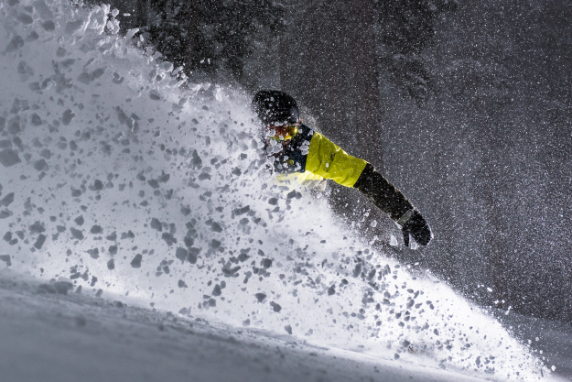Faculty Highlight: Michael Clark
Adventure Workshop 2018

Every fall our Adventure Sports Workshop sets up shop in Jackson Hole, Wyoming. From rock climbing, to whitewater kayaking, to mountain biking, to camping, this week is one of our favorites and is jam packed with adventure. While you can’t go wrong exploring and photographing the Tetons, it’s our spectacular faculty that sets us apart. We’re not going to lie; these folks are the best of the best. Not only do you get classroom time with them learning tricks to hone your craft, but you’ll also get to hang around a campfire, drink a few beers, and hear stories about life on the Trango Tower in Pakistan, sailing around the world, directing photography at Sports Illustrated, and big wave surfing at JAWS. As editors and photographers, members of the Summit family have played instrumental roles in the development of adventure sports photography. Flip through a Patagonia catalog, browse a North Face or Red Bull campaign, or scroll through any of the National Geographic Instagram feeds – chances are you will come across their work.
For our 2018 Adventure Workshop, we are excited to add Michael Clark to our faculty lineup. Michael is an extraordinary adventure photographer and has traveled around the world shooting travel and sports campaigns for clients like Red Bull, Elinchrom, New Balance, Nikon, and National Geographic Travel Magazine. To welcome him, we sat down with Michael to learn a bit more about his fascinating career.
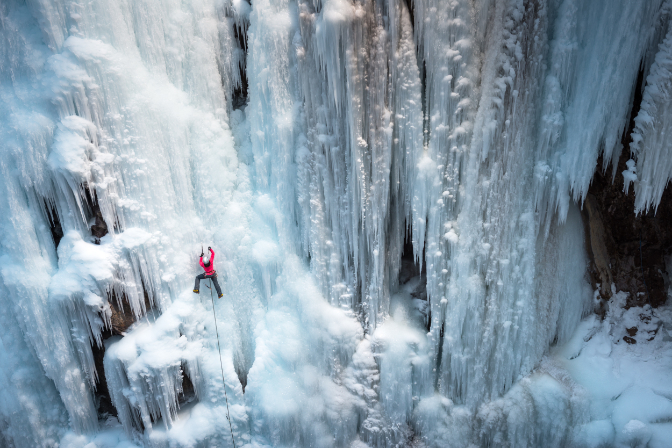
Dawn Glanc ice climbing in the Ouray Ice Park in Ouray, Colorado. © Michael Clark
Summit: What is your biography? Can you give us you life story in a few sentences?
MC: I have been a working adventure sports photographer now for 22 years. I started out as a rock climbing and mountaineering photographer and then slowly branched out into just about every adventure sport. I am based out of Santa Fe, New Mexico and travel on average six to seven months a year.
I am still a climber at heart and love those opportunities when I get to shoot climbing in any form, but it is also great to mix it up and work with athletes in a wide variety of sports.
See my official Bio here
S: How long have you been a professional photographer? Is this always what you have done?
MC: I was a Physicist before I was a photographer, but I was also an artist from a very young age. See the above answer for how long….
For the last 22 years I have worked full time as a pro photographer. This is pretty much all I have done for a career. It has been all consuming. This blog post might offer some more insight..
S: How did you get your start? What was it like becoming a professional?
MC: I worked in various outdoor stores for three and a half years while shooting rock climbing, ice climbing and mountaineering as much as possible. Working in an outdoor store gave me pro-deals on outdoor gear and also allowed me to meet a wide variety of amazing local athletes that I worked with to build my portfolio early on. In those first three years, I spent half of everything I made on film and processing. When I could, I worked part-time at the store and spent the other half of the month traveling and shooting whatever I could.
It was a slow process in those three years to build relationships with the climbing magazines, and later the climbing and outdoor gear manufacturers, but eventually my work started to get published more and more frequently. Once I had built up enough steady clients to pay for my dirtbag lifestyle, which didn’t require much, I jumped off the cliff so to speak to see if I could fly as a freelancer. It really felt like jumping off a cliff with no parachute. I had little to no savings, no safety net of any kind, and no health insurance. I worked my ass off 18 hours a day for years to make it work.
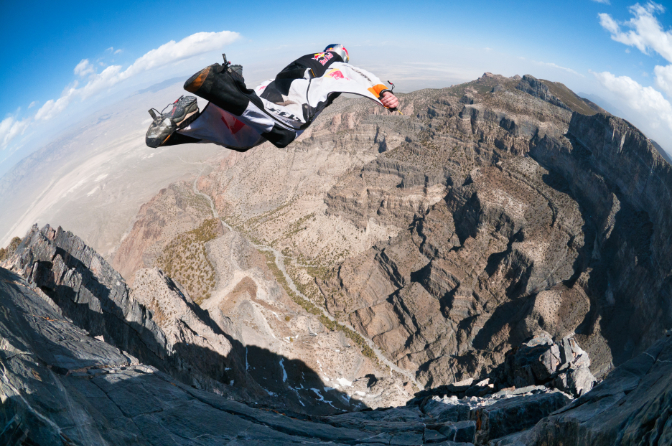
Red Bull Air Force Team members BASE jumping off a huge cliff in southwestern Utah in wing suits. © Michael Clark
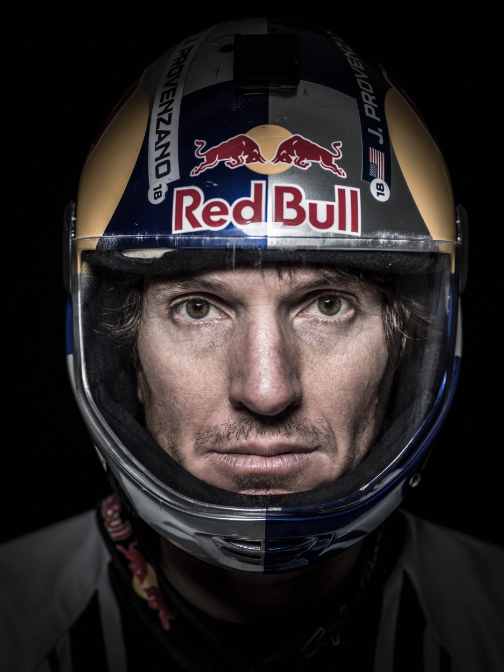
Portrait of Red Bull Air Force team member Jeffrey Provenzano at the Kirby Chambliss’ ranch near Eloy, Arizona. © Michael Clark
S: What was it about adventure sports that drew you in?
I got into rock climbing in my last semester at University. I quickly became obsessed with the sport. My whole life revolved around climbing and I spent pretty much every cent I had to keep traveling and climbing. Around that same time, I also turned down lucrative jobs in Physics because they weren’t anywhere near decent climbing. While I was traveling and climbing in France, I got the idea that I might be able to make money photographing climbing. I had studied photography, along with most of the art disciplines as a teenager, so I already had some photography chops. It was just a matter of putting two passions together: climbing and photography, and trying to make a living.
Since I first started rock climbing, I have been fascinated by risk and danger and how we as humans overcome those obstacles. I am also fascinated by nature and our place in it. I wanted to be an astronaut, which is why I went into Physics, but that didn’t work out – so I became a climber. I am also fascinated by the human mind and how we choose to live our lives. How does a world-class athlete overcome their fear, deal with the risk, and pull off what to outsiders seems impossible? Practice. Dedication. Commitment. Obsession. For adventure photographers it is no different, we have to have the same dedication, commitment and obsession to make it all work, actually make a living and improve our craft.
I want to show the incredible world of adventure sports to a larger audience, and relay to that audience just how incredible this world is, and how amazing the athletes are. What adventure athletes are capable of these days is mind-bending. If I can give a little insight into that world, and help tell the athletes’ stories, and convey just how far they have been able to push themselves and the sport then I have done my job—and hopefully I have opened up some eyes out there in the non-adventure sports world as to what is possible, not just in the athletic sense but also by showing a different model of making a living doing what you love.
Summit: What is on your project or photography bucket list? Is there any place or subject that you’ve been dying to shoot?
MC: There are still lots of places I want to travel to and photograph including Antarctica, New Zealand, Russia, Africa, the Himalayas and many others. As for subjects, I have photographed just about every adventure sports there is so it would be a matter of what sports would work in those locations. Over the last two decades I have slowly been checking off those locations and sports I have always wanted to photograph, whether on an assignment or on a personal project. I also have a laundry list of photo shoots I want to work on, many of which push the boundaries of what is possible technically with photography equipment and especially with advanced lighting techniques.
As for personal shoots, I have always wanted to go to the Serengeti and photograph Cheetahs. Since I was seven years old, I have fascinated by the big cats, and someday I’ll hopefully make that happen. I have no illusions of shooting that on an assignment. It would just be for me. .
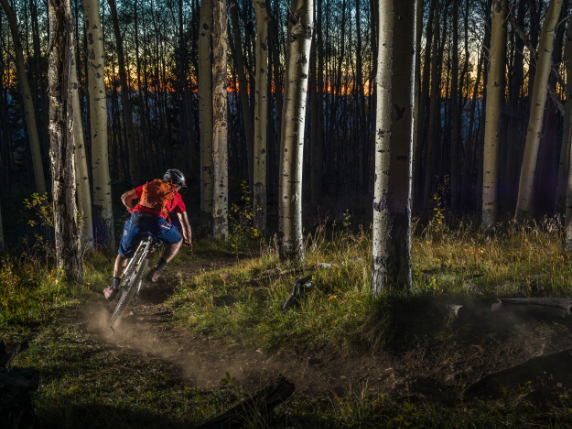
Chris Sheehan mountain biking under golden aspens on the Alamos Vista trail just above the Aspen Vista road in the Sangre de Cristo mountains above Santa Fe, New Mexico. © Michael Clark
S: What have you been working on lately? Any highlights from 2017?
Creatively, 2017 was an incredible year for me. My Lighting the Spirit project for Elinchrom and Red Bull Photography was the highlight of the year. Working with Rafa Ortiz, one of the best kayakers on the planet, and the crew, to craft incredible whitewater kayaking images with the new Elinchrom ELB 1200 was a career highlight. That shoot was two years in the making and it all came together better than I could have ever imagined.
There were also quite a few other highlights, including working with the Red Bull Air Force again and some personal shoots that helped fill out my portfolio.
S: We’ve been seeing some awesome surfing photos of yours from JAWS popping up on the internet and all over social media, can you tell us a bit about that shoot?
MC: As someone who lives in New Mexico, surfing isn’t something I photograph day to day. A few years ago JAWS came up big more than a dozen times and I missed every swell because I had other assignments. This year, the biggest swell in a decade came up and I was able to rearrange my schedule so I could head out and shoot the action.
The backstory to this trip is that over ten years ago, while writing my first printed book, I connected with Brian Bielmann, one of the most legendary surf photographers ever. He is one of my best friends and I have wanted to get out to JAWS during a big swell for years now. When this swell started to develop, Brian helped me get things dialed in so we could both be on jet skis right in front of the action. As you might imagine, riding a jet ski next to sixty- or seventy-foot waves and going over the shoulder of every wave is not a relaxing environment. For the first six hours I was trying hard not to puke. We also caught air (on the jet ski) off the top of the waves shoulder several times trying to outrun an oncoming wave. I have been in boats at Teahupo’o and have swum out at Pipeline and neither of those experiences were as physically jarring as being on a jet ski at JAWS. As with a lot of adventure photography, a little suffering is just the price of admission. I shot any and everything that rolled by. In the end, I shot over 9,000 images in two days at JAWS. I am still going through them.
While I have shot surfing on a few assignments, in general, I go out and shoot it for myself as everything depends on the waves and doesn’t fit very well into most assignment agendas. I have licensed dozens of my surf images from the past ten years or more for serious money so it works out in the end to shoot this content on spec. I also shoot surfing to expand my portfolio and because it is such a cool sport. Also, Hawaii, Tahiti and the normal surf spots do not suck. I always look forward to changing into flip-flops at the rental car office in Hawaii and then driving up to the north shore of Oahu or Maui with the windows rolled down, feeling the ocean breeze on my face. In many ways, shooting surfing feels like a vacation–at least until you swim out and get pummeled by a few big waves or sit on a rock hard boat for five days, 13-hours a day.
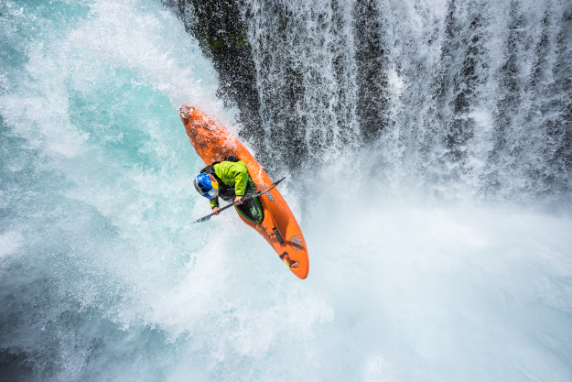
Rafa Ortiz dropping over Spirit Falls while whitewater kayaking on the Little White Salmon river near White Salmon, Washington. © Michael Clark
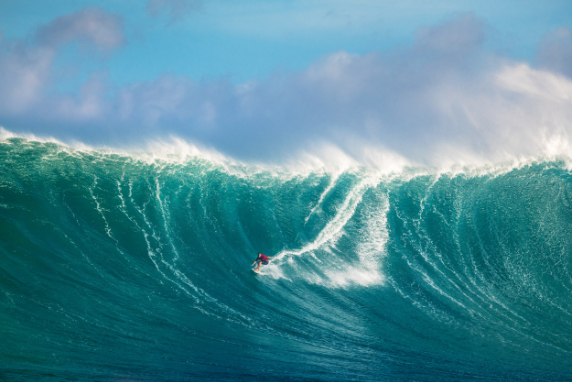
Makua Rothman dropping in with style on Peahi, a.k.a. JAWS, on the north shore of Maui, Hawaii. © Michael Clark
S: Any anticipations or thoughts about the upcoming Summit Adventure workshop? What are you most excited about?
MC: I have wanted to be a part of the Summit Adventure Workshop for years. It seems like a great workshop, with participants who are serious about adventure photography and it is in a stellar location. Honestly, having taught a lot of workshops on my own, I am very excited to teach in tandem with my peers. With such a great group of instructors, who have a wide range of experiences and backgrounds, I think that will help to create an incredibly energetic and creative vibe in the workshop.
S: When you are not taking photos, where can you be found? What do you like to do outside of photography?
MC: As an adventure photographer, I got into this career because I love adventure sports. My favorite sport is ice climbing—and I just got back from an ice climbing trip last week up in Ouray, Colorado. I can’t wait to get back out on the ice. I climb in the gym and outside as much as possible to maintain fitness. I also love riding my road bike and generally having an adventure whenever possible. Living in Santa Fe, New Mexico, I am often up in the mountains skiing or hiking, or at the crag getting beat down on steep routes.
Alternatively, I do love a good movie and I probably watch way too many movies, especially while traveling on long flights. When I am home, we have a great community here, and whether we are heading to the Opera, or just grabbing some Green Chile Stew at La Choza here in town, it is always nice to catch up with friends and take in some of the phenomenal local culture.
